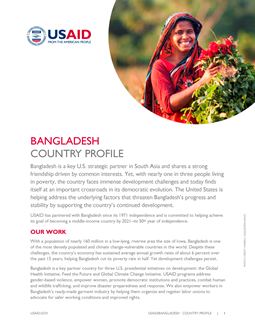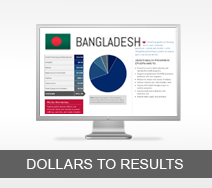With a population of nearly 160 million in a low-lying, riverine area the size of Iowa, Bangladesh is one of the most densely populated and climate change-vulnerable countries in the world. Despite these challenges, the country’s economy has sustained average annual growth rates of about 6 percent over the past 15 years, helping Bangladesh cut its poverty rate in half. Yet development challenges persist.
Bangladesh is a key partner country for three U.S. presidential initiatives on development: the Global Health Initiative, Feed the Future and Global Climate Change Initiative. USAID programs address gender-based violence, empower women, promote democratic institutions and practices, combat human and wildlife trafficking, and improve disaster preparedness and response. We also empower workers in Bangladesh’s ready-made garment industry by helping them organize and register labor unions to advocate for safer working conditions and improved rights.
Bangladesh Country Profile (PDF) ![]() (pdf - 298k)
(pdf - 298k)
Global Health
Over the past two decades, USAID has helped Bangladesh reduce maternal and child mortality by two-thirds while dramatically increasing the use of family planning services. Through a network of non-governmental organization clinics, USAID is providing more than 30 million maternal, child and family planning consultations a year. USAID has also introduced mobile messaging technology to reach more than 1.5 million subscribers with crucial health information about vaccinations and proper nutrition.
Agriculture and Food Security
With USAID support, Bangladesh has nearly tripled rice production over the past 20 years. At the same time, Bangladeshi diets are severely lacking in diversity and 36 percent of children under-5 is stunted. USAID is introducing new technologies to boost agricultural production and ensure that Bangladeshis have better access to nutritious food. To accomplish this, USAID trains farmers to use better quality seeds, apply fertilizer more efficiently and irrigate their fields more effectively to increase their yields. In 2015, more than 2 million farmers adopted improved agriculture and aquaculture techniques resulting in $155 million in incremental sales–a 20 percent increase from the prior year.
Environment and Global Climate Change
High population density, gradual loss of arable land and degradation in biodiverse areas have put such extreme pressure on natural resources that Bangladesh now has one of the world’s lowest percentages of national forest cover. USAID promotes biodiversity conservation by teaching people who live in or near 28 forests and wetlands new ways to earn money so they rely less on exploiting natural resources. USAID is also improving the local management of more than 2.5 million acres of wetlands and forests.










Comment
Make a general inquiry or suggest an improvement.